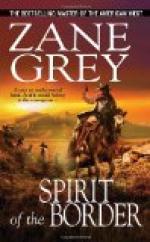During the night a noise awakened him. For a moment he heard nothing except the fall of the rain. Then came the hum of voices, followed by the soft tread of moccasined feet. He knew there was an Indian town ten miles across the country, and believed some warriors, belated on a hunting trip, had sought the cabin for shelter.
The hunter lay perfectly quiet, awaiting developments. If the Indians had flint and steel, and struck a light, he was almost certain to be discovered. He listened to their low conversation, and understood from the language that they were Delawares.
A moment later he heard the rustling of leaves and twigs, accompanied by the metallic click of steel against some hard substance. The noise was repeated, and then followed by a hissing sound, which he knew to be the burning of a powder on a piece of dry wood, after which rays of light filtered through cracks of the unstable floor of the loft.
The man placed his eye to one of these crevices, and counted eleven Indians, all young braves, with the exception of the chief. The Indians had been hunting; they had haunches of deer and buffalo tongues, together with several packs of hides. Some of them busied themselves drying their weapons; others sat down listlessly, plainly showing their weariness, and two worked over the smouldering fire. The damp leaves and twigs burned faintly, yet there was enough to cause the hunter fear that he might be discovered. He believed he had not much to worry about from the young braves, but the hawk-eyed chief was dangerous.
And he was right. Presently the stalwart chief heard, or saw, a drop of water fall from the loft. It came from the hunter’s wet coat. Almost any one save an Indian scout would have fancied this came from the roof. As the chief’s gaze roamed everywhere over the interior of the cabin his expression was plainly distrustful. His eye searched the wet clay floor, but hardly could have discovered anything there, because the hunter’s moccasined tracks had been obliterated by the footprints of the Indians. The chief’s suspicions seemed to be allayed.
But in truth this chief, with the wonderful sagacity natural to Indians, had observed matters which totally escaped the young braves, and, like a wily old fox, he waited to see which cub would prove the keenest. Not one of them, however, noted anything unusual. They sat around the fire, ate their meat and parched corn, and chatted volubly.
The chief arose and, walking to the ladder, ran his hand along one of the rungs.
“Ugh!” he exclaimed.
Instantly he was surrounded by ten eager, bright-eyed braves. He extended his open palm; it was smeared with wet clay like that under his feet. Simultaneously with their muttered exclamations the braves grasped their weapons. They knew there was a foe above them. It was a paleface, for an Indian would have revealed himself.
The hunter, seeing he was discovered, acted with the unerring judgment and lightning-like rapidity of one long accustomed to perilous situations. Drawing his tomahawk and noiselessly stepping to the hole in the loft, he leaped into the midst of the astounded Indians.




